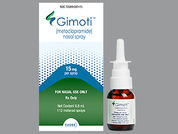Gimoti
Metoclopramide Hcl
What is Gimoti used for?
Metoclopramide is used by diabetic patients who have poor emptying of their stomachs (gastroparesis). Treating gastroparesis can decrease symptoms of nausea, vomiting, and stomach/abdominal fullness. Metoclopramide works by blocking a natural substance (dopamine). It speeds up stomach emptying and movement of the upper intestines. This drug is not recommended for use in children due to an increased risk of serious side effects (such as muscle spasms/uncontrolled muscle movements). Ask the doctor or pharmacist for details.
CHEMICAL NAME
DRUG TYPE
Gi DisordersGimoti Prices
Searching for the lowest prices
What does Gimoti look like?
View all Gimoti Image Information (1)Gimoti Frequently Asked Questions
If you miss a dose, skip the missed dose. Use your next dose at the regular time. Do not double the dose to catch up.
IMPORTANT: HOW TO USE THIS INFORMATION: This is a summary and does NOT have all possible information about this product. This information does not assure that this product is safe, effective, or appropriate for you. This information is not individual medical advice and does not substitute for the advice of your health care professional. Always ask your health care professional for complete information about this product and your specific health needs.
